Wagner To Give Air Defense System To Iran-Backed Hezbollah
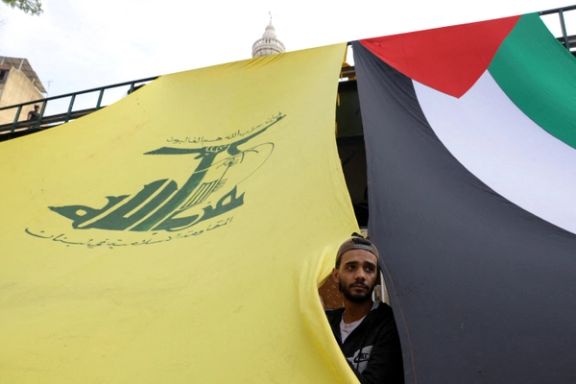
The US has intelligence that Russia's Wagner mercenary group plans to provide Iran-backed Lebanese militia Hezbollah with an air defense system.

The US has intelligence that Russia's Wagner mercenary group plans to provide Iran-backed Lebanese militia Hezbollah with an air defense system.
The Wall Street Journal cited unidentified US officials as saying that Wagner plans to supply the Pantsir-S1 system, known by NATO as the SA-22, which uses anti-aircraft missiles and air-defense guns to intercept aircraft.
Wagner Group, which was funded by the Russian state and has been brought firmly under Kremlin control since an aborted mutiny by its former leader, Yevgeny Prigozhin, in June, did not reply to a request for comment from Reuters.
One unidentified US official quoted by the Journal said that Washington had not confirmed that the system had been sent. But US officials are monitoring discussions involving Wagner and Hezbollah, the Journal said.
The Journal said that the Pantsir system would be provided to Hezbollah via Syria, where Russia propped up President Bashar al-Assad by entering the civil war there in 2015.
Iran's Revolutionary Guards founded Hezbollah in 1982, in the middle of Lebanon's 1975-90 civil war. It was part of Iran's effort to export its 1979 Islamic Revolution around the region and fight Israeli forces after their 1982 invasion of Lebanon.
Lebanon's Hezbollah has been exchanging fire with Israeli forces across the border since its Palestinian ally Hamas in Gaza declared war on Israel on October 7.
(Reporting by Reuters)
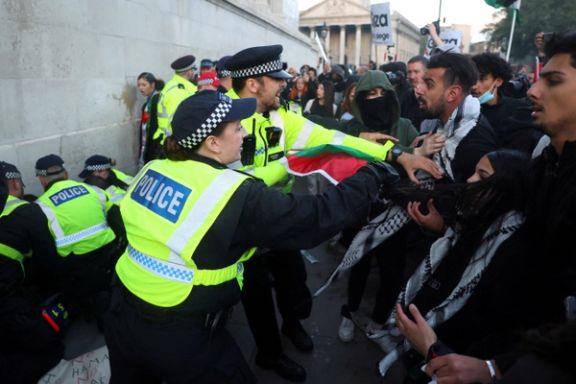
An investigation in The Times of London has revealed more than six UK-based groups with ties to the Iranian regime and active in pro-Hamas rallies.
It comes amid rising fears that the Iranian regime’s influence on UK soil is deepening, as seen in the weekly pro-Palestine / pro-Hamas protests which have been shown to be fuelled by Tehran-linked groups.
In the latest report from The Times, it claims “Whitehall briefings, informed by intelligence, suggest that Tehran has links to a core group of institutions to assert soft power, drive influence and sow tension”.
It went on to add that a “wider network comprising mosques, charities and other third sector organisations are also thought to have regime links”.
The latest revelations come amid the war between Israel and Iran-backed Hamas, which last weekend saw over 100,000 protesters on the streets of London backing Gaza.
Anti-regime activist Vahid Beheshti, was attacked at the protest, in a suspected act by IRGC agents. He was also assaulted on October 14 by activists carrying images of Khamenei and assassinated Quds Force commander, Qassem Soleimani. One man was arrested and charged for possessing a knife in public after allegedly threatening to behead him.
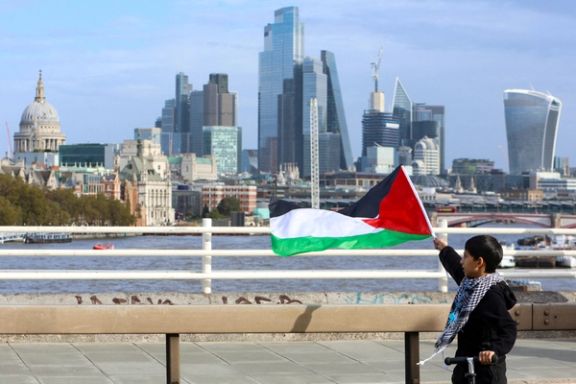
One of the organizations, The Times claims, with direct links is the Islamic Centre of England [ICE] which is at the center of an inquiry by the Charity Commission. Another is the Islamic Human Rights Commission, an advocacy group with links to Iran’s supreme council.
Leaflets at last week’s protests contained typically incendiary regime rhetoric about Israel, calling it the “usurper Zionist regime” and as a cancer that would be eradicated. Protesters were even seen holding photos of Supreme Leader, Al Khamenei who recently hailed its proxy for the atrocities on October 7 when it invaded Israel, killing 1,400 mostly civilians and taking a further 240 hostage in Gaza.
As if it were the streets of Tehran, placards could be seen with the words “the Zionist regime is dying” and others even held flags of Iran and its proxy, the Al-Hashd Al-Sha'bi militia force.
Just last month UK security chiefs continued to voice concerns about the threat posed by Iran on UK soil. Earlier this year, it was revealed that multiple attacks by the IRGC have been thwarted, including on Iran International offices which were temporarily forced to relocate to Washington.
As regime fervour continued to simmer, The Union of Islamic Student Associations in Europe, which has active branches in Britain and several other European countries, shared a clip of Khamenei’s speech spliced with footage of London protests on Telegram on Wednesday, The Times revealed.
Only in August, the group, which is said to have direct backing from Khamenei, hosted several senior IRGC figures in online talks viewed by British students, who were encouraged to fight in an “apocalyptic war” against Iran’s enemies and Jews.
This week, Khamenei gave a speech mocking the allegations that the regime had its hand in mass protests across Europe, in a speech Wednesday laughing at the idea of the public claiming “the London Basiji must be behind this, or the Paris Basiji must have done this”. Instead, he insinuated it was simply the weight of anti-Israel fever sweeping the streets of Europe.
Behesthti said the actions of recent weeks show ever more the need for the UK and others to proscribe fully Iran’s IRGC as the regime’s threats to the West become ever more feverish. His speech addressed all Muslims around the world that it is not only the "Zionist regime of Israel" that is standing against Islam, but also Britain, France and the United States.
“Khamenei is openly giving an order of Jihad to all Muslims, in order to go after the "enemies of Islam", namely Great Britain, France and the United States, according to the Supreme Leader of the Islamic Republic.
“Yet, given this, our government in the UK is still reluctant to proscribe the Islamic Revolutionary Guard Corps. This is a necessary step in order to send a strong message that the UK does not tolerate terrorism and continued threats against our national security.”
The US proscribed the IRGC in 2019 under then-President Donald Trump and while many other nations have designated members, with the sensitivity of Iran’s nuclear program, it has become a global bone of contention for countries such as the UK and Canada as to whether or not to designate the group as a whole.
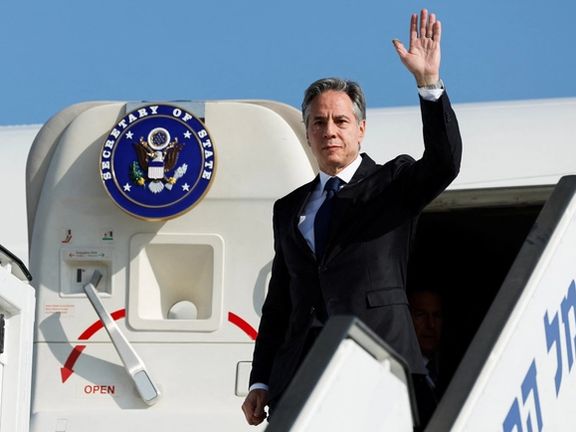
US Secretary of State Antony Blinken arrived in Israel on Friday for urgent talks with Israeli officials about their escalating war with Hamas in Gaza.
This is Blinken’s third trip to Israel in less than a month since the conflict erupted after Hamas’ October 7 terror attack. Blinken will also visit Jordan and may make additional stops on the region over the weekend.
Blinken will meet Israeli Prime Minister Benjamin Netanyahu and other top officials on the trip, which comes at a highly charged and sensitive time as Israel encircles Gaza City at the same time as international criticism of its tactics increases over many civilian casualties.
President Joe Biden has called for a “humanitarian pause” in the fighting in order to arrange the evacuation of dual Palestinian citizens and foreigners still trapped in Gaza as well as try to secure the release of more than 200 hostages that Hamas is holding and to increase the supply of desperately needed humanitarian aid to civilians in Gaza.
Blinken will again stress Israel’s right to defend itself but will also be making the case for Israel to respect the rules of war in its assaults in Gaza as well as to begin to consider post-war scenarios for how the territory can be run if and when it succeeds in eradicating Hamas.
For the past week, the administration has been pushing the importance of resolving the Israeli-Palestinian conflict through a two-state resolution, saying that is the only way to establish a durable and lasting peace. However, neither the current Israeli nor Palestinian leaderships have shown interest in negotiations to that end, which have failed multiple times since the 1990s.
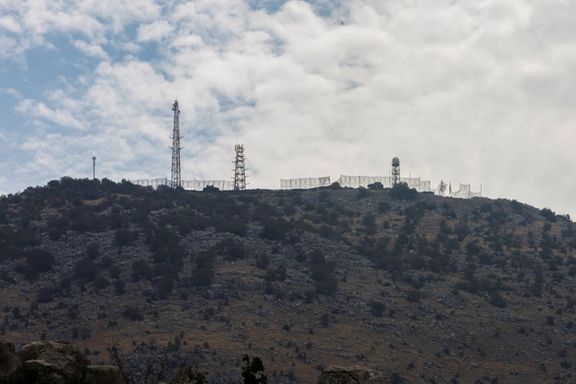
Lebanon's Hezbollah said it had attacked Israeli an army position using explosive drones for the first time, prompting heavy Israeli shelling, escalating clashes at the frontier.
The Israeli army said it was striking a series of Hezbollah targets in Lebanon following several launches towards Israel, in a post on social media platform X.
Lebanon's National News Agency reported Israeli shells hitting various areas of the south along the border.
In a statement, Iran-backed Hezbollah said it had used two drones packed with explosives to attack an Israeli army command position in the disputed Shebaa Farms area at the Lebanese-Israeli border.
Meanwhile, an Israeli army spokesman said that the Iman Hussein Brigade, an Iranian-sponsored militia from Syria, has been transferred to south Lebanon to support Hezbollah.
The attack comes a few days after Hezbollah said for the first time it had used a surface-to-air missile against an Israeli drone.
Hezbollah said the drones filled with "a large quantity of explosives" had attacked the headquarters of the Israeli battalion in the Shebaa Farms area, and they had hit their targets.
Israel has held the Shebaa Farms, a 15-square-mile (39-square-km) area of land, since the 1967 Middle East war. Both Syria and Lebanon claim the Shebaa Farms are Lebanese.
Hezbollah fighters have been exchanging fire with Israeli forces across the Israeli-Lebanese border since the Palestinian militant group Hamas and Israel went to war on Oct. 7, in the deadliest escalation at the frontier since a 2006 war.
Hezbollah leader Sayyed Hassan Nasrallah is due on Friday to deliver his first speech since the onset of the violence.
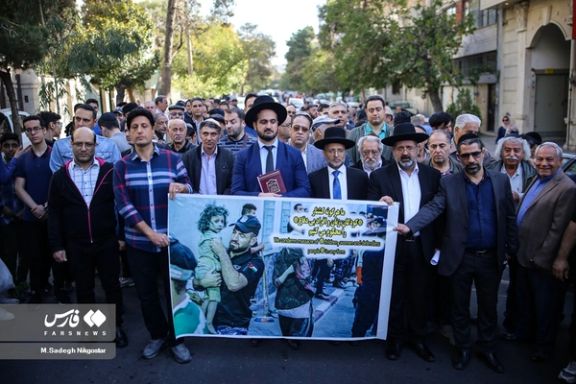
Amid Iran’s unequivocal support for its proxy Hamas, the regime has pushed Iranian Jews to cut ties with Israel-based friends and relatives.
Sources told Iran International Wednesday that an unknown number of members of the community were forced to block their relatives' phone numbers in Israel and some have left family and group chats on messaging apps, including WhatsApp. The sources did not specify how the authorities pressure them but there are other reports about unknown people – presumably intelligence or Revolutionary Guard agents -- calling the Jewish people in Shiraz and pushing them into cutting relations with their Israeli relatives.
Clearly organized by the regime, Iranian Jews have held ceremonies in synagogues across various cities over the past few days to express support for Hamas, which killed 1,400 mostly civilians on October 7 and took over 230 hostages to Gaza.
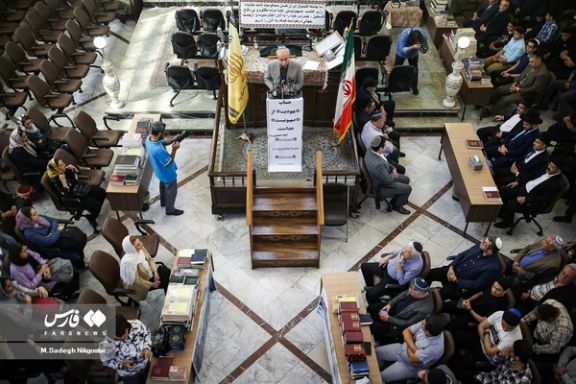
In April, the regime pressured the Jewish community to participate in Quds Day, which coincided with the Jewish holiday of Passover. The one-year anniversary of Mahsa Amini’s murder, which sparked months of anti regime protests in 2022, coincided with the Jewish New Year on September 16, prompting community leaders to warn Jews to stay off the streets.
In a Telegram posting from Iran’s roughly 9,000 strong Jewish community, the leadership wrote “All worshipers are strongly requested to refrain from stopping and gathering in the streets for any reason during Rosh Hashanah and after performing religious duties in synagogues.”
Although Iran has voted several times on pro-Palestinian UN resolutions that called for a two-state solution for the conflict, Tehran’s official ultimate goal is the destruction of the Jewish state, as prophesied by the octogenarian despot.
The pressure on the Jewish community comes on the backdrop of Iran extending its criteria to criminalize support for Israel. This week, a body tasked with determining instances of criminal content, under the judiciary, updated its articles to include any activity in support of Israel in cybersphere.
Since Hamas declared war with the operation it codenamed al-Aqsa Flood (Storm in Persian), Iranians have become even more vocal about their distance from the Islamic Republic’s narrative of the conflict, making trendy hashtags like IranStandsWithIsrael or chanting creative slogans about where the regime should put the Palestinian flag.
An emotional funeral for a young Israeli soldier of Iranian origin killed in the Hamas attack earlier this week went viral, jogging Iranians’ memory of deep common roots with the Jewish community. Shirel Haeimpour’s grandfather sang a traditional Jewish love song and a wedding song with his Esfahani Persian accent for the young woman.
In October, the Islamic Republic revealed again that it exerts considerable pressure on the country’s tiny Jewish community to denigrate Israel. The Tehran-born Beni Sabti, an expert on Iran from the Israeli National Security and Strategy Institute, told Iran International that the Islamic Republic strong-armed the Tehran Jewish community into condemning Israel on its Telegram channel for its efforts to defeat Iran’s ally, Hamas.
Iranian authorities have recently nudged down their saber-rattling against Israel and claim Tehran does not have any proxy militia under its command. Iran’s ruler Ali Khamenei attempted to counter international reports suggesting Iran's role in organizing pro-Hamas rallies in major European and US cities during a speech on Wednesday. He dismissed the claims, saying it's as if the Basij militia of the Revolutionary Guard had branches in London and Paris. In fact, the UK now claims Iran is one of the country's number one threats, having attempted multiple attacks on UK soil in the last year. Khamenei also called on Muslim states to cease oil, food and goods exports to Israel.
US and European officials are concerned that actions by the Iranian government could escalate the conflict to other fronts with Iranian proxy forces' potential involvement. Since the war broke out, multiple attacks on US bases in the Middle East have already set tensions to crisis level.
Prior to the war, Israel and Saudi Arabia were edging ever closer to opening diplomatic ties, in the footsteps of other nations such as the United Arab Emirates which was one of several countries party to the US-brokered Abraham Accords of 2020. However, the warming of ties with Israel and Saudi had been a huge point of contention for the regime which repeatedly warned against the normalization.
US President Joe Biden listed the disruption of the normalization of relations between Saudi Arabia and Israel as one of the reasons behind the Hamas attack.
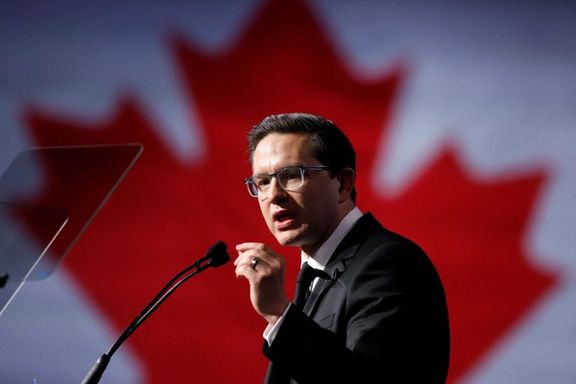
Pierre Poilievre, the leader of Canada’s opposition Conservative Party, blames Iran for Hamas’ massacre of October 7.
Speaking exclusively to Iran International, he said: “I don’t believe that Hamas has the sophistication and coordination to carry out an attack at this scale without major logistical planning and intelligence backing from a government.”
Poilievre called the Iranian regime “the number one state sponsor of terror” and “the most likely culprit” in Hamas’ onslaught on Israel which saw 1,400 mostly civilians murdered and 240 more taken hostage to Gaza.
He also slammed Iran’s Revolutionary Guard (IRGC) for its coordination of Hamas and Hezbollah terror groups, among Iran's network of regional proxies, stressing the need to “criminalize” the IRGC in Canada.
Iranian officials have repeatedly rejected allegations about Tehran’s role in helping Hamas organize its invasion which saw thousands of Hamas fighters invade by air, land and sea in the single most deadly day in Jewish history since the Holocaust.
In an interview with CNN, Iran's Foreign Minister Hossein Amir-Abdollahian claimed that Tehran neither has a proxy group nor runs a proxy war in the region.
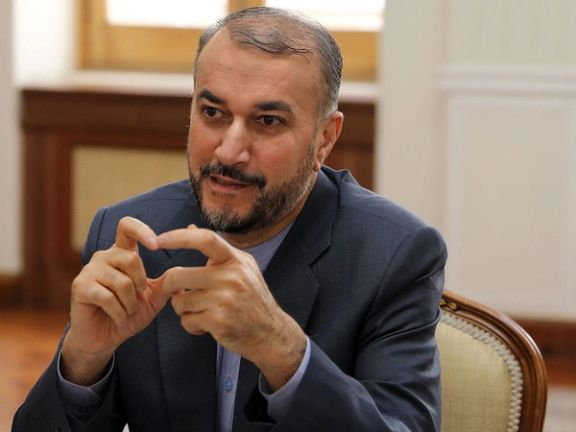
Poilievre took Canadian Prime Minister Justin Trudeau to task for choosing not to list IRGC fully as a terror group and stated that he does not understand the rationale behind the government’s decision. The US designated the IRGC as a whole in 2019 under the Trump administration.
The Conservative party “will not relent until the IRGC is criminalized as a terrorist group in Canada,” Poilievre vowed.
In August, Canada decided to impose sanctions on 170 Iranians and 192 Iranian entities, including IRGC officials.
Then, in November, Prime Minister Justin Trudeau said Canada has designated Iran's IRGC leadership, adding that Canada will “restrict financial transactions with the Islamic Republic of Iran associated with the IRGC and the proxies that support them".
He added: “These actions are some of the strongest measures anywhere against Iran.”
However, Poilievre said that the implementation of these sanctions depends on “how serious the government is.”
It was not the first time the IRGC had been subject to sanctions. In October 2022, in the wake of the Women, Life, Freedom uprising, Canada announced sanctions against IRGC, permanently banning over 10,000 of its officers from entering Canada.
“We will restrict financial transactions with the Islamic Republic of Iran associated with the IRGC and the proxies that support them. These actions are some of the strongest measures anywhere against Iran,” Trudeau said at the time.
However, the opposition leader believes that Trudeau’s government lacks the “law enforcement rigor” to fully implement IRGC sanctions.
Poilievre confirmed the possibility of Tehran’s using Canada as a platform to operate its proxy wars, adding that there are reports about “well-placed regime thugs” in Canada who spend the money that “they stole from the Iranian people.” Western governments including the US and UK are increasingly concerned about regime activity with the UK branding Iran among its top threats and the FBI just revealing that Iran has tried to kill American officials on US soil.
He also called for tightening immigration regulations to ensure that anyone “willingly associated” with the Iranian regime should not be eligible for entry to Canada.
Reiterating his support for the “Woman Life Freedom” movement, he called on Iranians to remain adamant in their pursuit of freedom despite the regime’s mounting crackdown.
“We need a regime change in Tehran. And it will only happen if the people keep fighting. It's a long journey, but don't give up,” he said.